Report on Global Sustainable Tourism Development and its Impact
VerifiedAdded on 2023/01/12
|9
|2514
|42
Report
AI Summary
This report provides a comprehensive analysis of global sustainable tourism development, focusing on the adverse impacts of traditional tourism and the need for sustainable practices. It explores the conceptual development of sustainable tourism, evaluating key principles for strategy development, and assessing the roles of key stakeholders like governments, clients, and employees. The report examines how these stakeholders contribute to the global sustainable tourism agenda, highlighting the importance of community involvement, ethical practices, and vocational training. Furthermore, it compares and contrasts the outcomes of sustainable tourism strategies in both emerging and established tourism destinations. The report uses Topdeck Travel as a case study, evaluating their practices and strategies within the context of global sustainability. It concludes with a call for the implementation of sustainable approaches to maintain environmental integrity, meet traveler needs, and ensure long-term industry viability.
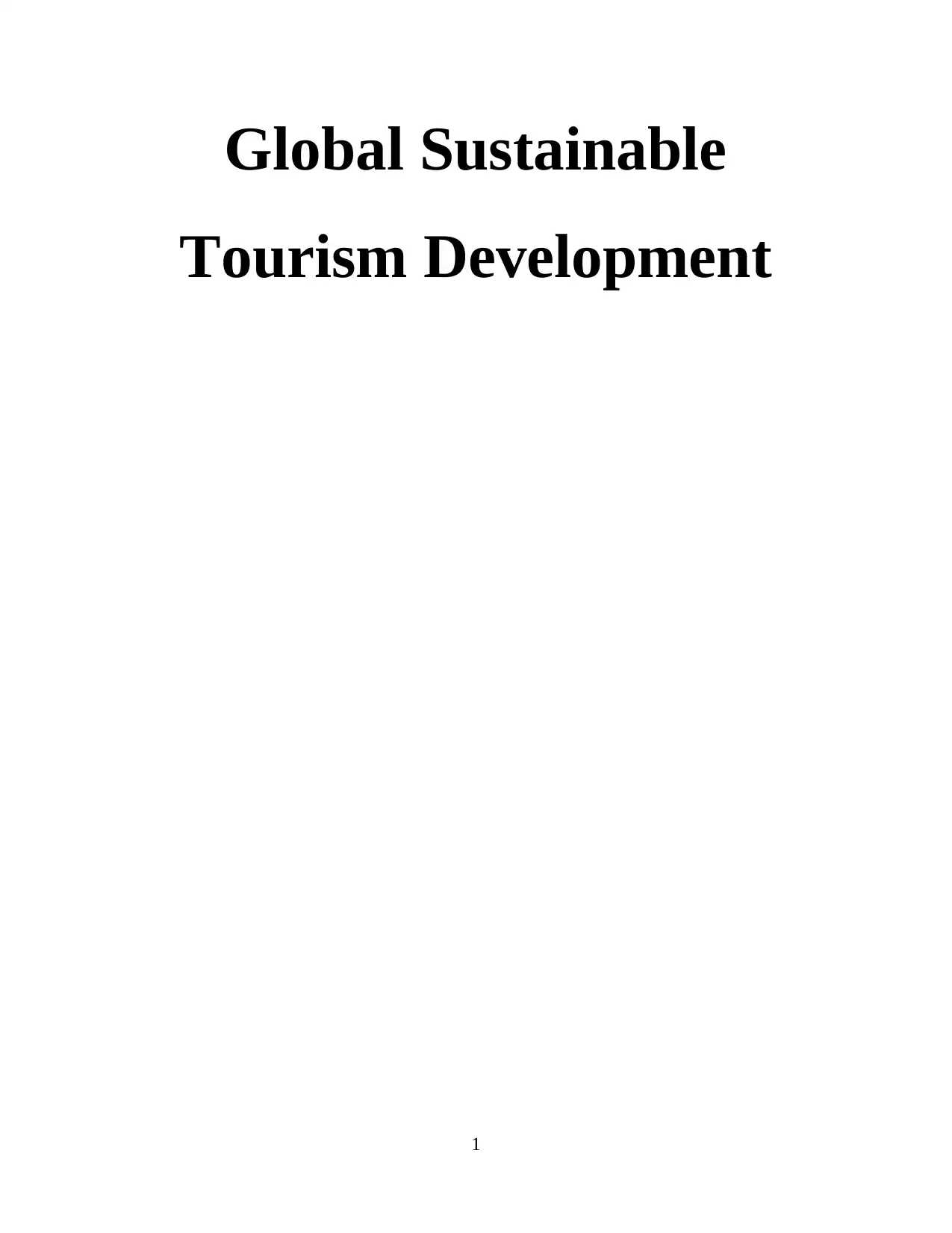
Global Sustainable
Tourism Development
1
Tourism Development
1
Paraphrase This Document
Need a fresh take? Get an instant paraphrase of this document with our AI Paraphraser
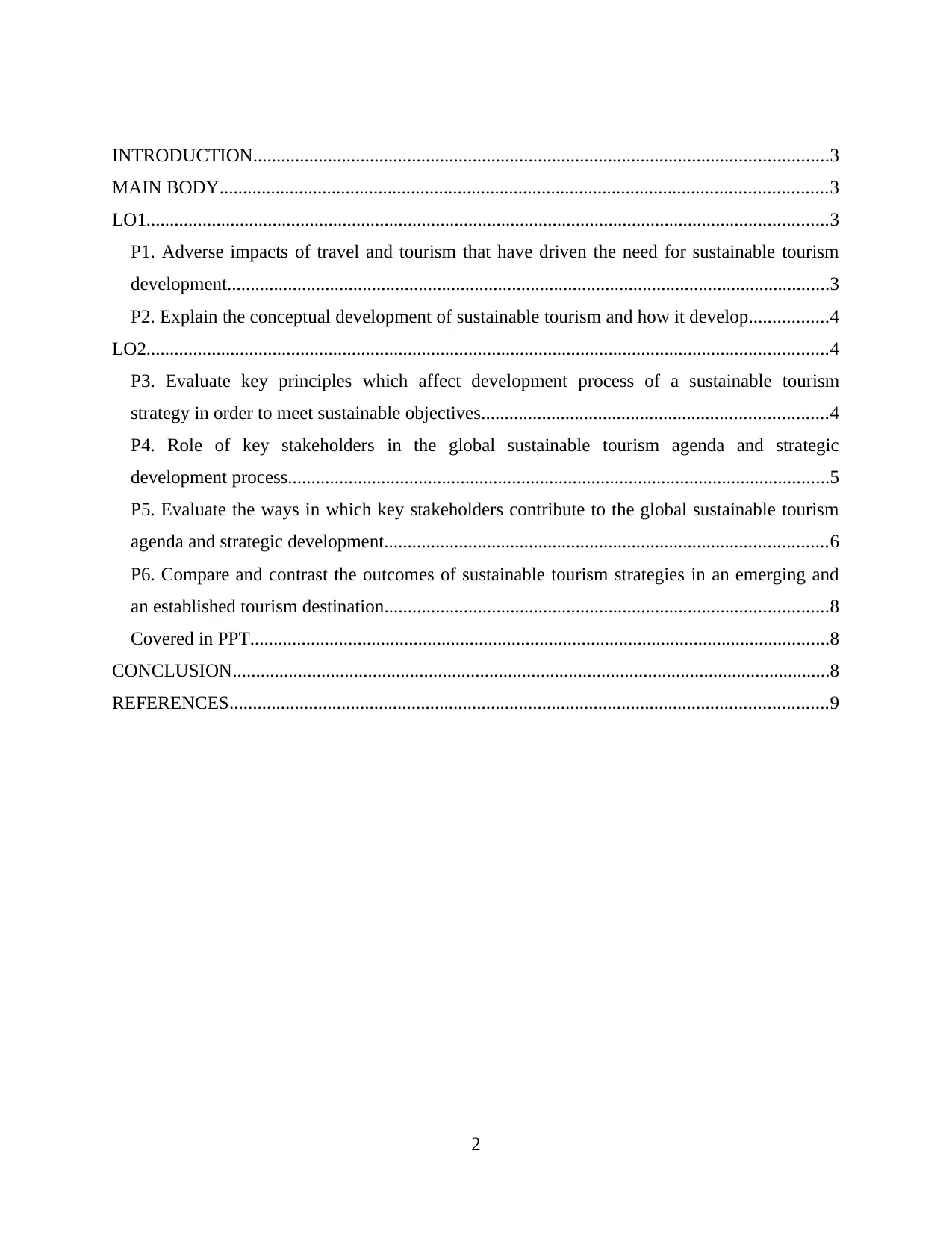
INTRODUCTION...........................................................................................................................3
MAIN BODY..................................................................................................................................3
LO1..................................................................................................................................................3
P1. Adverse impacts of travel and tourism that have driven the need for sustainable tourism
development.................................................................................................................................3
P2. Explain the conceptual development of sustainable tourism and how it develop.................4
LO2..................................................................................................................................................4
P3. Evaluate key principles which affect development process of a sustainable tourism
strategy in order to meet sustainable objectives..........................................................................4
P4. Role of key stakeholders in the global sustainable tourism agenda and strategic
development process....................................................................................................................5
P5. Evaluate the ways in which key stakeholders contribute to the global sustainable tourism
agenda and strategic development...............................................................................................6
P6. Compare and contrast the outcomes of sustainable tourism strategies in an emerging and
an established tourism destination...............................................................................................8
Covered in PPT............................................................................................................................8
CONCLUSION................................................................................................................................8
REFERENCES................................................................................................................................9
2
MAIN BODY..................................................................................................................................3
LO1..................................................................................................................................................3
P1. Adverse impacts of travel and tourism that have driven the need for sustainable tourism
development.................................................................................................................................3
P2. Explain the conceptual development of sustainable tourism and how it develop.................4
LO2..................................................................................................................................................4
P3. Evaluate key principles which affect development process of a sustainable tourism
strategy in order to meet sustainable objectives..........................................................................4
P4. Role of key stakeholders in the global sustainable tourism agenda and strategic
development process....................................................................................................................5
P5. Evaluate the ways in which key stakeholders contribute to the global sustainable tourism
agenda and strategic development...............................................................................................6
P6. Compare and contrast the outcomes of sustainable tourism strategies in an emerging and
an established tourism destination...............................................................................................8
Covered in PPT............................................................................................................................8
CONCLUSION................................................................................................................................8
REFERENCES................................................................................................................................9
2
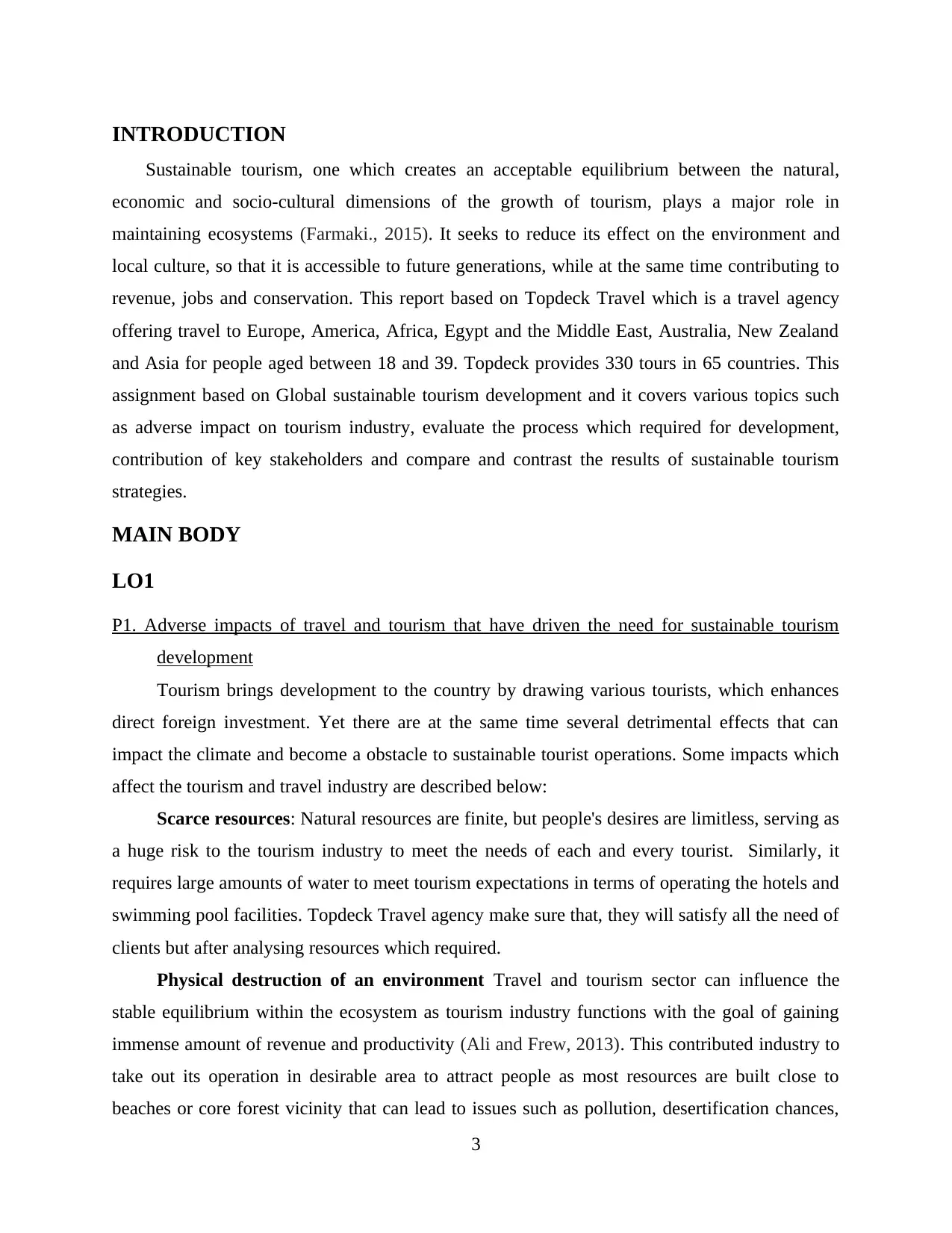
INTRODUCTION
Sustainable tourism, one which creates an acceptable equilibrium between the natural,
economic and socio-cultural dimensions of the growth of tourism, plays a major role in
maintaining ecosystems (Farmaki., 2015). It seeks to reduce its effect on the environment and
local culture, so that it is accessible to future generations, while at the same time contributing to
revenue, jobs and conservation. This report based on Topdeck Travel which is a travel agency
offering travel to Europe, America, Africa, Egypt and the Middle East, Australia, New Zealand
and Asia for people aged between 18 and 39. Topdeck provides 330 tours in 65 countries. This
assignment based on Global sustainable tourism development and it covers various topics such
as adverse impact on tourism industry, evaluate the process which required for development,
contribution of key stakeholders and compare and contrast the results of sustainable tourism
strategies.
MAIN BODY
LO1
P1. Adverse impacts of travel and tourism that have driven the need for sustainable tourism
development
Tourism brings development to the country by drawing various tourists, which enhances
direct foreign investment. Yet there are at the same time several detrimental effects that can
impact the climate and become a obstacle to sustainable tourist operations. Some impacts which
affect the tourism and travel industry are described below:
Scarce resources: Natural resources are finite, but people's desires are limitless, serving as
a huge risk to the tourism industry to meet the needs of each and every tourist. Similarly, it
requires large amounts of water to meet tourism expectations in terms of operating the hotels and
swimming pool facilities. Topdeck Travel agency make sure that, they will satisfy all the need of
clients but after analysing resources which required.
Physical destruction of an environment Travel and tourism sector can influence the
stable equilibrium within the ecosystem as tourism industry functions with the goal of gaining
immense amount of revenue and productivity (Ali and Frew, 2013). This contributed industry to
take out its operation in desirable area to attract people as most resources are built close to
beaches or core forest vicinity that can lead to issues such as pollution, desertification chances,
3
Sustainable tourism, one which creates an acceptable equilibrium between the natural,
economic and socio-cultural dimensions of the growth of tourism, plays a major role in
maintaining ecosystems (Farmaki., 2015). It seeks to reduce its effect on the environment and
local culture, so that it is accessible to future generations, while at the same time contributing to
revenue, jobs and conservation. This report based on Topdeck Travel which is a travel agency
offering travel to Europe, America, Africa, Egypt and the Middle East, Australia, New Zealand
and Asia for people aged between 18 and 39. Topdeck provides 330 tours in 65 countries. This
assignment based on Global sustainable tourism development and it covers various topics such
as adverse impact on tourism industry, evaluate the process which required for development,
contribution of key stakeholders and compare and contrast the results of sustainable tourism
strategies.
MAIN BODY
LO1
P1. Adverse impacts of travel and tourism that have driven the need for sustainable tourism
development
Tourism brings development to the country by drawing various tourists, which enhances
direct foreign investment. Yet there are at the same time several detrimental effects that can
impact the climate and become a obstacle to sustainable tourist operations. Some impacts which
affect the tourism and travel industry are described below:
Scarce resources: Natural resources are finite, but people's desires are limitless, serving as
a huge risk to the tourism industry to meet the needs of each and every tourist. Similarly, it
requires large amounts of water to meet tourism expectations in terms of operating the hotels and
swimming pool facilities. Topdeck Travel agency make sure that, they will satisfy all the need of
clients but after analysing resources which required.
Physical destruction of an environment Travel and tourism sector can influence the
stable equilibrium within the ecosystem as tourism industry functions with the goal of gaining
immense amount of revenue and productivity (Ali and Frew, 2013). This contributed industry to
take out its operation in desirable area to attract people as most resources are built close to
beaches or core forest vicinity that can lead to issues such as pollution, desertification chances,
3
⊘ This is a preview!⊘
Do you want full access?
Subscribe today to unlock all pages.

Trusted by 1+ million students worldwide
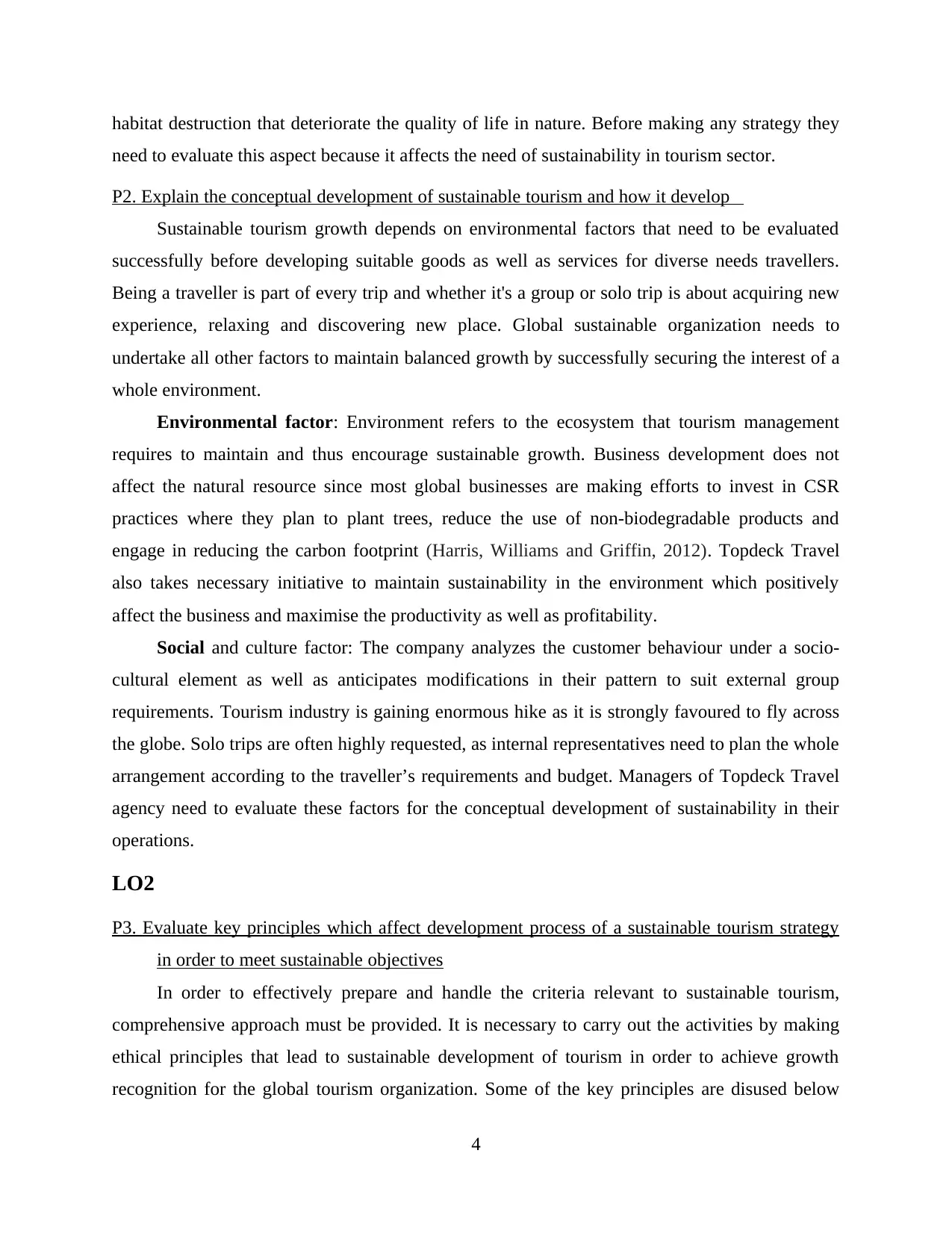
habitat destruction that deteriorate the quality of life in nature. Before making any strategy they
need to evaluate this aspect because it affects the need of sustainability in tourism sector.
P2. Explain the conceptual development of sustainable tourism and how it develop
Sustainable tourism growth depends on environmental factors that need to be evaluated
successfully before developing suitable goods as well as services for diverse needs travellers.
Being a traveller is part of every trip and whether it's a group or solo trip is about acquiring new
experience, relaxing and discovering new place. Global sustainable organization needs to
undertake all other factors to maintain balanced growth by successfully securing the interest of a
whole environment.
Environmental factor: Environment refers to the ecosystem that tourism management
requires to maintain and thus encourage sustainable growth. Business development does not
affect the natural resource since most global businesses are making efforts to invest in CSR
practices where they plan to plant trees, reduce the use of non-biodegradable products and
engage in reducing the carbon footprint (Harris, Williams and Griffin, 2012). Topdeck Travel
also takes necessary initiative to maintain sustainability in the environment which positively
affect the business and maximise the productivity as well as profitability.
Social and culture factor: The company analyzes the customer behaviour under a socio-
cultural element as well as anticipates modifications in their pattern to suit external group
requirements. Tourism industry is gaining enormous hike as it is strongly favoured to fly across
the globe. Solo trips are often highly requested, as internal representatives need to plan the whole
arrangement according to the traveller’s requirements and budget. Managers of Topdeck Travel
agency need to evaluate these factors for the conceptual development of sustainability in their
operations.
LO2
P3. Evaluate key principles which affect development process of a sustainable tourism strategy
in order to meet sustainable objectives
In order to effectively prepare and handle the criteria relevant to sustainable tourism,
comprehensive approach must be provided. It is necessary to carry out the activities by making
ethical principles that lead to sustainable development of tourism in order to achieve growth
recognition for the global tourism organization. Some of the key principles are disused below
4
need to evaluate this aspect because it affects the need of sustainability in tourism sector.
P2. Explain the conceptual development of sustainable tourism and how it develop
Sustainable tourism growth depends on environmental factors that need to be evaluated
successfully before developing suitable goods as well as services for diverse needs travellers.
Being a traveller is part of every trip and whether it's a group or solo trip is about acquiring new
experience, relaxing and discovering new place. Global sustainable organization needs to
undertake all other factors to maintain balanced growth by successfully securing the interest of a
whole environment.
Environmental factor: Environment refers to the ecosystem that tourism management
requires to maintain and thus encourage sustainable growth. Business development does not
affect the natural resource since most global businesses are making efforts to invest in CSR
practices where they plan to plant trees, reduce the use of non-biodegradable products and
engage in reducing the carbon footprint (Harris, Williams and Griffin, 2012). Topdeck Travel
also takes necessary initiative to maintain sustainability in the environment which positively
affect the business and maximise the productivity as well as profitability.
Social and culture factor: The company analyzes the customer behaviour under a socio-
cultural element as well as anticipates modifications in their pattern to suit external group
requirements. Tourism industry is gaining enormous hike as it is strongly favoured to fly across
the globe. Solo trips are often highly requested, as internal representatives need to plan the whole
arrangement according to the traveller’s requirements and budget. Managers of Topdeck Travel
agency need to evaluate these factors for the conceptual development of sustainability in their
operations.
LO2
P3. Evaluate key principles which affect development process of a sustainable tourism strategy
in order to meet sustainable objectives
In order to effectively prepare and handle the criteria relevant to sustainable tourism,
comprehensive approach must be provided. It is necessary to carry out the activities by making
ethical principles that lead to sustainable development of tourism in order to achieve growth
recognition for the global tourism organization. Some of the key principles are disused below
4
Paraphrase This Document
Need a fresh take? Get an instant paraphrase of this document with our AI Paraphraser
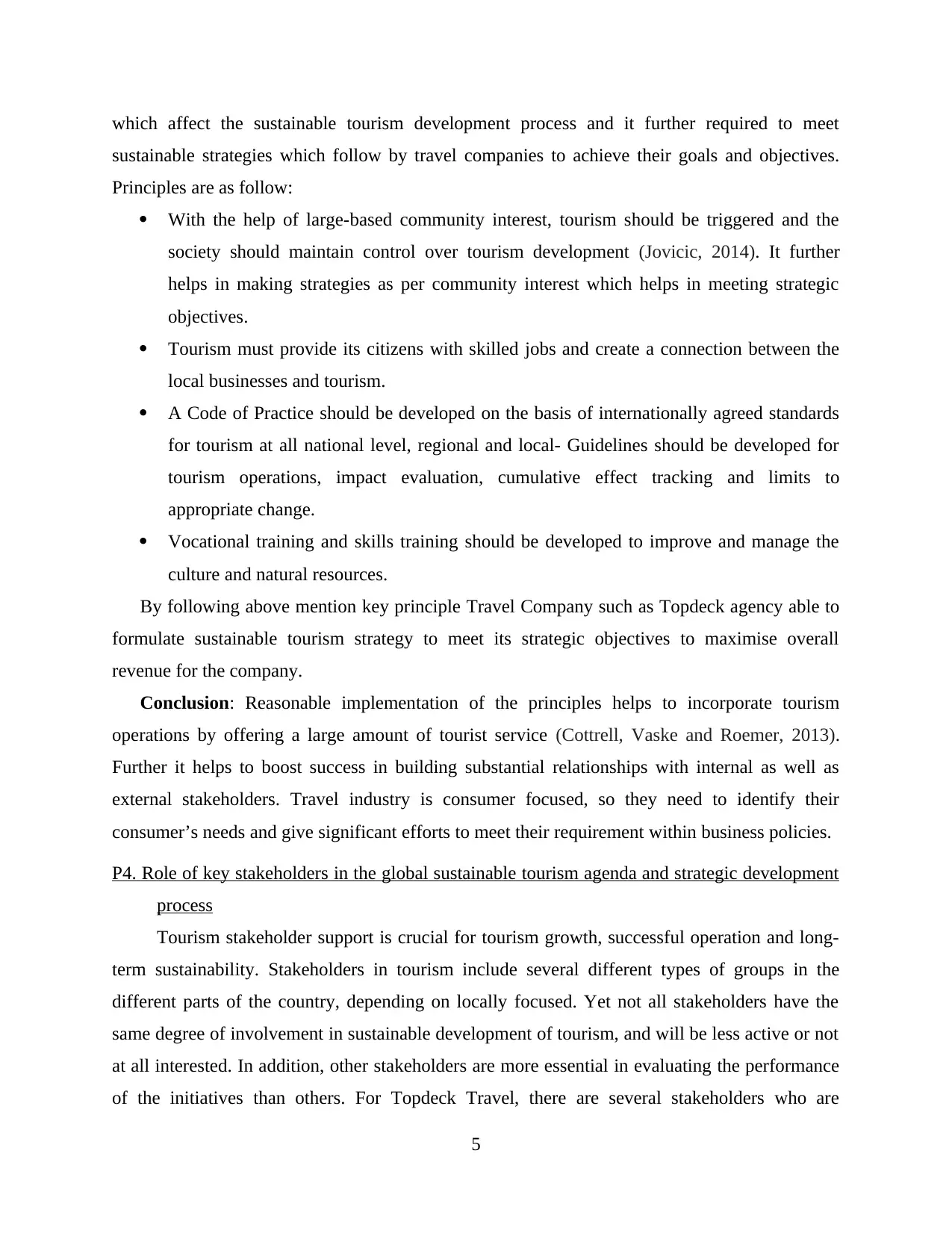
which affect the sustainable tourism development process and it further required to meet
sustainable strategies which follow by travel companies to achieve their goals and objectives.
Principles are as follow:
With the help of large-based community interest, tourism should be triggered and the
society should maintain control over tourism development (Jovicic, 2014). It further
helps in making strategies as per community interest which helps in meeting strategic
objectives.
Tourism must provide its citizens with skilled jobs and create a connection between the
local businesses and tourism.
A Code of Practice should be developed on the basis of internationally agreed standards
for tourism at all national level, regional and local- Guidelines should be developed for
tourism operations, impact evaluation, cumulative effect tracking and limits to
appropriate change.
Vocational training and skills training should be developed to improve and manage the
culture and natural resources.
By following above mention key principle Travel Company such as Topdeck agency able to
formulate sustainable tourism strategy to meet its strategic objectives to maximise overall
revenue for the company.
Conclusion: Reasonable implementation of the principles helps to incorporate tourism
operations by offering a large amount of tourist service (Cottrell, Vaske and Roemer, 2013).
Further it helps to boost success in building substantial relationships with internal as well as
external stakeholders. Travel industry is consumer focused, so they need to identify their
consumer’s needs and give significant efforts to meet their requirement within business policies.
P4. Role of key stakeholders in the global sustainable tourism agenda and strategic development
process
Tourism stakeholder support is crucial for tourism growth, successful operation and long-
term sustainability. Stakeholders in tourism include several different types of groups in the
different parts of the country, depending on locally focused. Yet not all stakeholders have the
same degree of involvement in sustainable development of tourism, and will be less active or not
at all interested. In addition, other stakeholders are more essential in evaluating the performance
of the initiatives than others. For Topdeck Travel, there are several stakeholders who are
5
sustainable strategies which follow by travel companies to achieve their goals and objectives.
Principles are as follow:
With the help of large-based community interest, tourism should be triggered and the
society should maintain control over tourism development (Jovicic, 2014). It further
helps in making strategies as per community interest which helps in meeting strategic
objectives.
Tourism must provide its citizens with skilled jobs and create a connection between the
local businesses and tourism.
A Code of Practice should be developed on the basis of internationally agreed standards
for tourism at all national level, regional and local- Guidelines should be developed for
tourism operations, impact evaluation, cumulative effect tracking and limits to
appropriate change.
Vocational training and skills training should be developed to improve and manage the
culture and natural resources.
By following above mention key principle Travel Company such as Topdeck agency able to
formulate sustainable tourism strategy to meet its strategic objectives to maximise overall
revenue for the company.
Conclusion: Reasonable implementation of the principles helps to incorporate tourism
operations by offering a large amount of tourist service (Cottrell, Vaske and Roemer, 2013).
Further it helps to boost success in building substantial relationships with internal as well as
external stakeholders. Travel industry is consumer focused, so they need to identify their
consumer’s needs and give significant efforts to meet their requirement within business policies.
P4. Role of key stakeholders in the global sustainable tourism agenda and strategic development
process
Tourism stakeholder support is crucial for tourism growth, successful operation and long-
term sustainability. Stakeholders in tourism include several different types of groups in the
different parts of the country, depending on locally focused. Yet not all stakeholders have the
same degree of involvement in sustainable development of tourism, and will be less active or not
at all interested. In addition, other stakeholders are more essential in evaluating the performance
of the initiatives than others. For Topdeck Travel, there are several stakeholders who are
5
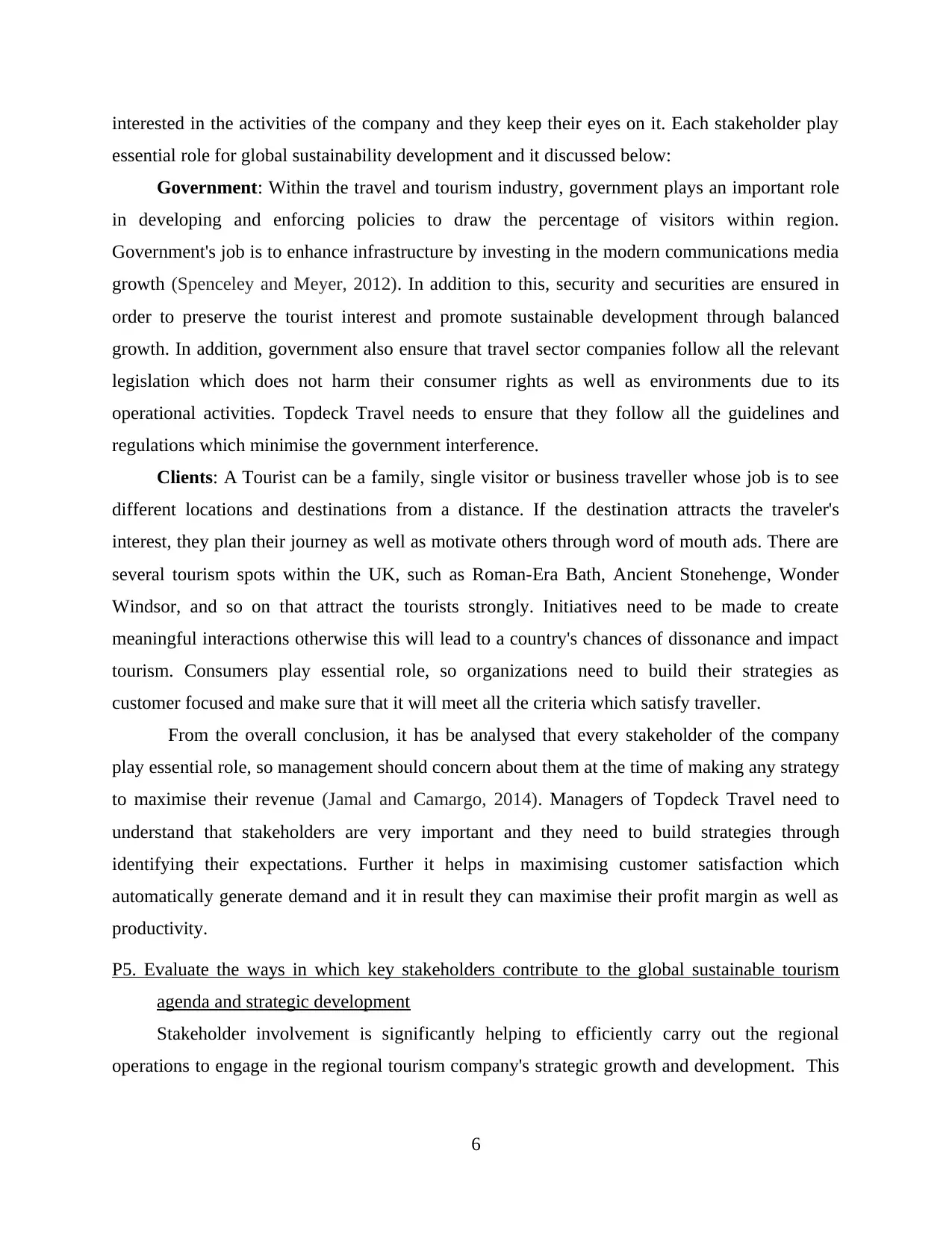
interested in the activities of the company and they keep their eyes on it. Each stakeholder play
essential role for global sustainability development and it discussed below:
Government: Within the travel and tourism industry, government plays an important role
in developing and enforcing policies to draw the percentage of visitors within region.
Government's job is to enhance infrastructure by investing in the modern communications media
growth (Spenceley and Meyer, 2012). In addition to this, security and securities are ensured in
order to preserve the tourist interest and promote sustainable development through balanced
growth. In addition, government also ensure that travel sector companies follow all the relevant
legislation which does not harm their consumer rights as well as environments due to its
operational activities. Topdeck Travel needs to ensure that they follow all the guidelines and
regulations which minimise the government interference.
Clients: A Tourist can be a family, single visitor or business traveller whose job is to see
different locations and destinations from a distance. If the destination attracts the traveler's
interest, they plan their journey as well as motivate others through word of mouth ads. There are
several tourism spots within the UK, such as Roman-Era Bath, Ancient Stonehenge, Wonder
Windsor, and so on that attract the tourists strongly. Initiatives need to be made to create
meaningful interactions otherwise this will lead to a country's chances of dissonance and impact
tourism. Consumers play essential role, so organizations need to build their strategies as
customer focused and make sure that it will meet all the criteria which satisfy traveller.
From the overall conclusion, it has be analysed that every stakeholder of the company
play essential role, so management should concern about them at the time of making any strategy
to maximise their revenue (Jamal and Camargo, 2014). Managers of Topdeck Travel need to
understand that stakeholders are very important and they need to build strategies through
identifying their expectations. Further it helps in maximising customer satisfaction which
automatically generate demand and it in result they can maximise their profit margin as well as
productivity.
P5. Evaluate the ways in which key stakeholders contribute to the global sustainable tourism
agenda and strategic development
Stakeholder involvement is significantly helping to efficiently carry out the regional
operations to engage in the regional tourism company's strategic growth and development. This
6
essential role for global sustainability development and it discussed below:
Government: Within the travel and tourism industry, government plays an important role
in developing and enforcing policies to draw the percentage of visitors within region.
Government's job is to enhance infrastructure by investing in the modern communications media
growth (Spenceley and Meyer, 2012). In addition to this, security and securities are ensured in
order to preserve the tourist interest and promote sustainable development through balanced
growth. In addition, government also ensure that travel sector companies follow all the relevant
legislation which does not harm their consumer rights as well as environments due to its
operational activities. Topdeck Travel needs to ensure that they follow all the guidelines and
regulations which minimise the government interference.
Clients: A Tourist can be a family, single visitor or business traveller whose job is to see
different locations and destinations from a distance. If the destination attracts the traveler's
interest, they plan their journey as well as motivate others through word of mouth ads. There are
several tourism spots within the UK, such as Roman-Era Bath, Ancient Stonehenge, Wonder
Windsor, and so on that attract the tourists strongly. Initiatives need to be made to create
meaningful interactions otherwise this will lead to a country's chances of dissonance and impact
tourism. Consumers play essential role, so organizations need to build their strategies as
customer focused and make sure that it will meet all the criteria which satisfy traveller.
From the overall conclusion, it has be analysed that every stakeholder of the company
play essential role, so management should concern about them at the time of making any strategy
to maximise their revenue (Jamal and Camargo, 2014). Managers of Topdeck Travel need to
understand that stakeholders are very important and they need to build strategies through
identifying their expectations. Further it helps in maximising customer satisfaction which
automatically generate demand and it in result they can maximise their profit margin as well as
productivity.
P5. Evaluate the ways in which key stakeholders contribute to the global sustainable tourism
agenda and strategic development
Stakeholder involvement is significantly helping to efficiently carry out the regional
operations to engage in the regional tourism company's strategic growth and development. This
6
⊘ This is a preview!⊘
Do you want full access?
Subscribe today to unlock all pages.

Trusted by 1+ million students worldwide
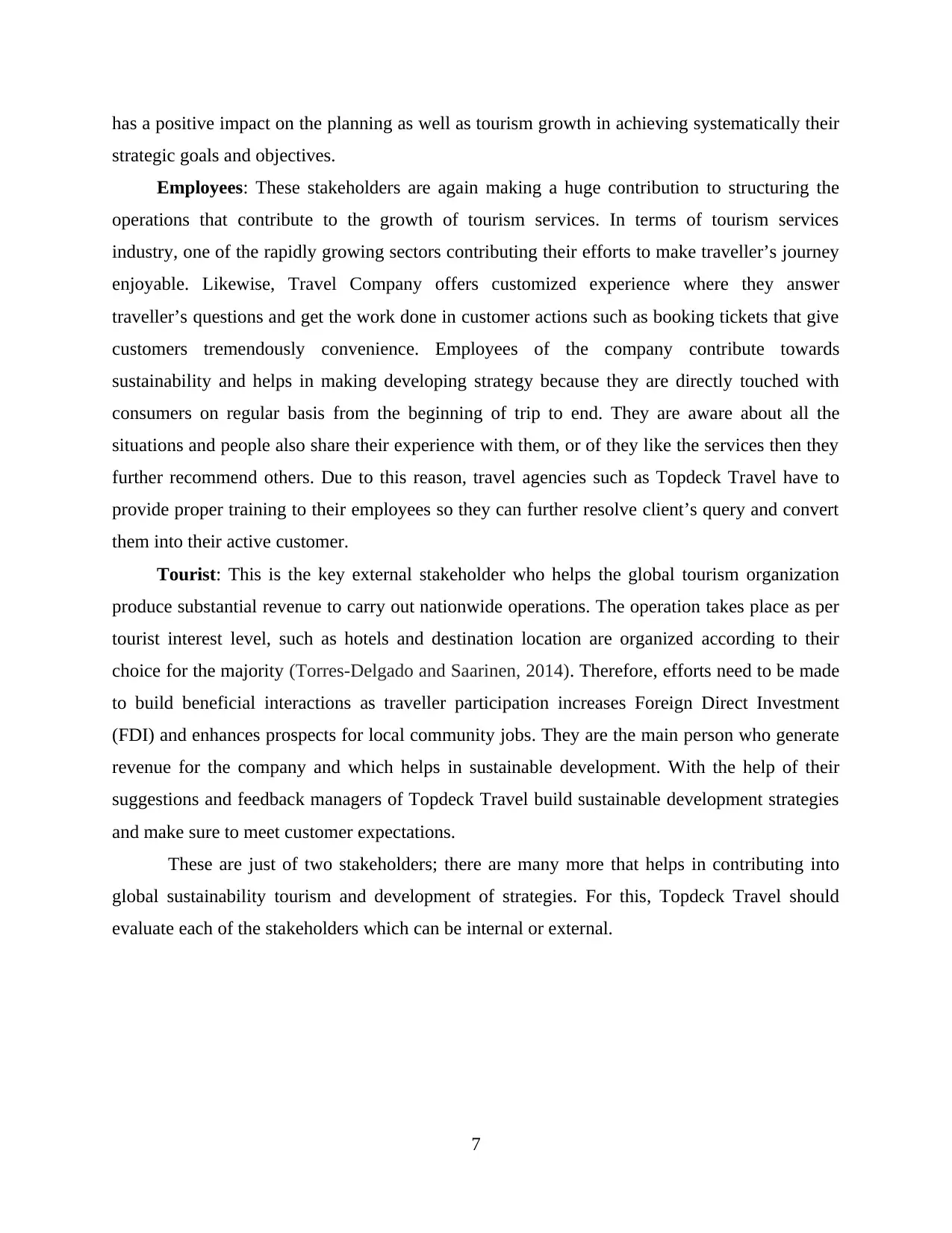
has a positive impact on the planning as well as tourism growth in achieving systematically their
strategic goals and objectives.
Employees: These stakeholders are again making a huge contribution to structuring the
operations that contribute to the growth of tourism services. In terms of tourism services
industry, one of the rapidly growing sectors contributing their efforts to make traveller’s journey
enjoyable. Likewise, Travel Company offers customized experience where they answer
traveller’s questions and get the work done in customer actions such as booking tickets that give
customers tremendously convenience. Employees of the company contribute towards
sustainability and helps in making developing strategy because they are directly touched with
consumers on regular basis from the beginning of trip to end. They are aware about all the
situations and people also share their experience with them, or of they like the services then they
further recommend others. Due to this reason, travel agencies such as Topdeck Travel have to
provide proper training to their employees so they can further resolve client’s query and convert
them into their active customer.
Tourist: This is the key external stakeholder who helps the global tourism organization
produce substantial revenue to carry out nationwide operations. The operation takes place as per
tourist interest level, such as hotels and destination location are organized according to their
choice for the majority (Torres-Delgado and Saarinen, 2014). Therefore, efforts need to be made
to build beneficial interactions as traveller participation increases Foreign Direct Investment
(FDI) and enhances prospects for local community jobs. They are the main person who generate
revenue for the company and which helps in sustainable development. With the help of their
suggestions and feedback managers of Topdeck Travel build sustainable development strategies
and make sure to meet customer expectations.
These are just of two stakeholders; there are many more that helps in contributing into
global sustainability tourism and development of strategies. For this, Topdeck Travel should
evaluate each of the stakeholders which can be internal or external.
7
strategic goals and objectives.
Employees: These stakeholders are again making a huge contribution to structuring the
operations that contribute to the growth of tourism services. In terms of tourism services
industry, one of the rapidly growing sectors contributing their efforts to make traveller’s journey
enjoyable. Likewise, Travel Company offers customized experience where they answer
traveller’s questions and get the work done in customer actions such as booking tickets that give
customers tremendously convenience. Employees of the company contribute towards
sustainability and helps in making developing strategy because they are directly touched with
consumers on regular basis from the beginning of trip to end. They are aware about all the
situations and people also share their experience with them, or of they like the services then they
further recommend others. Due to this reason, travel agencies such as Topdeck Travel have to
provide proper training to their employees so they can further resolve client’s query and convert
them into their active customer.
Tourist: This is the key external stakeholder who helps the global tourism organization
produce substantial revenue to carry out nationwide operations. The operation takes place as per
tourist interest level, such as hotels and destination location are organized according to their
choice for the majority (Torres-Delgado and Saarinen, 2014). Therefore, efforts need to be made
to build beneficial interactions as traveller participation increases Foreign Direct Investment
(FDI) and enhances prospects for local community jobs. They are the main person who generate
revenue for the company and which helps in sustainable development. With the help of their
suggestions and feedback managers of Topdeck Travel build sustainable development strategies
and make sure to meet customer expectations.
These are just of two stakeholders; there are many more that helps in contributing into
global sustainability tourism and development of strategies. For this, Topdeck Travel should
evaluate each of the stakeholders which can be internal or external.
7
Paraphrase This Document
Need a fresh take? Get an instant paraphrase of this document with our AI Paraphraser
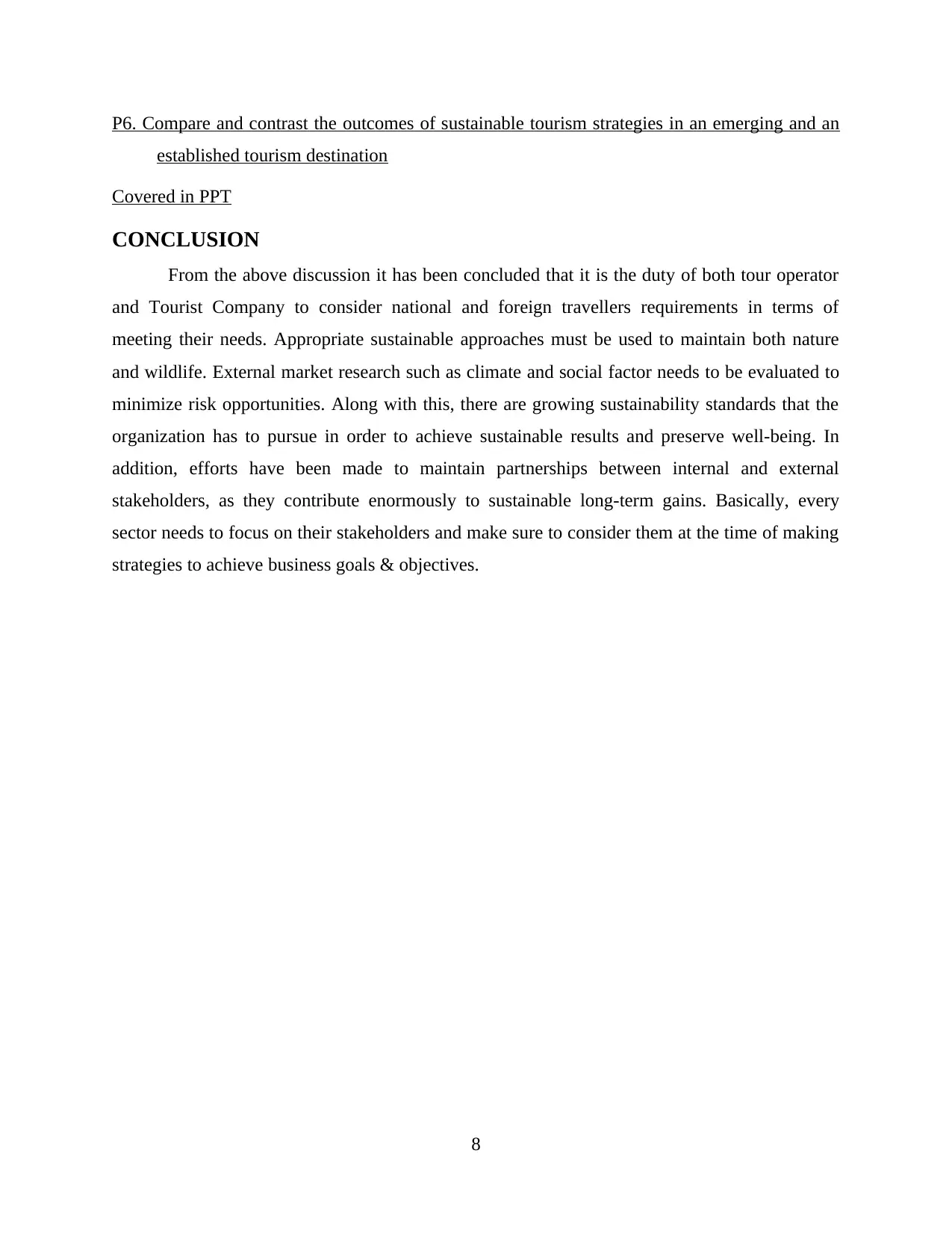
P6. Compare and contrast the outcomes of sustainable tourism strategies in an emerging and an
established tourism destination
Covered in PPT
CONCLUSION
From the above discussion it has been concluded that it is the duty of both tour operator
and Tourist Company to consider national and foreign travellers requirements in terms of
meeting their needs. Appropriate sustainable approaches must be used to maintain both nature
and wildlife. External market research such as climate and social factor needs to be evaluated to
minimize risk opportunities. Along with this, there are growing sustainability standards that the
organization has to pursue in order to achieve sustainable results and preserve well-being. In
addition, efforts have been made to maintain partnerships between internal and external
stakeholders, as they contribute enormously to sustainable long-term gains. Basically, every
sector needs to focus on their stakeholders and make sure to consider them at the time of making
strategies to achieve business goals & objectives.
8
established tourism destination
Covered in PPT
CONCLUSION
From the above discussion it has been concluded that it is the duty of both tour operator
and Tourist Company to consider national and foreign travellers requirements in terms of
meeting their needs. Appropriate sustainable approaches must be used to maintain both nature
and wildlife. External market research such as climate and social factor needs to be evaluated to
minimize risk opportunities. Along with this, there are growing sustainability standards that the
organization has to pursue in order to achieve sustainable results and preserve well-being. In
addition, efforts have been made to maintain partnerships between internal and external
stakeholders, as they contribute enormously to sustainable long-term gains. Basically, every
sector needs to focus on their stakeholders and make sure to consider them at the time of making
strategies to achieve business goals & objectives.
8
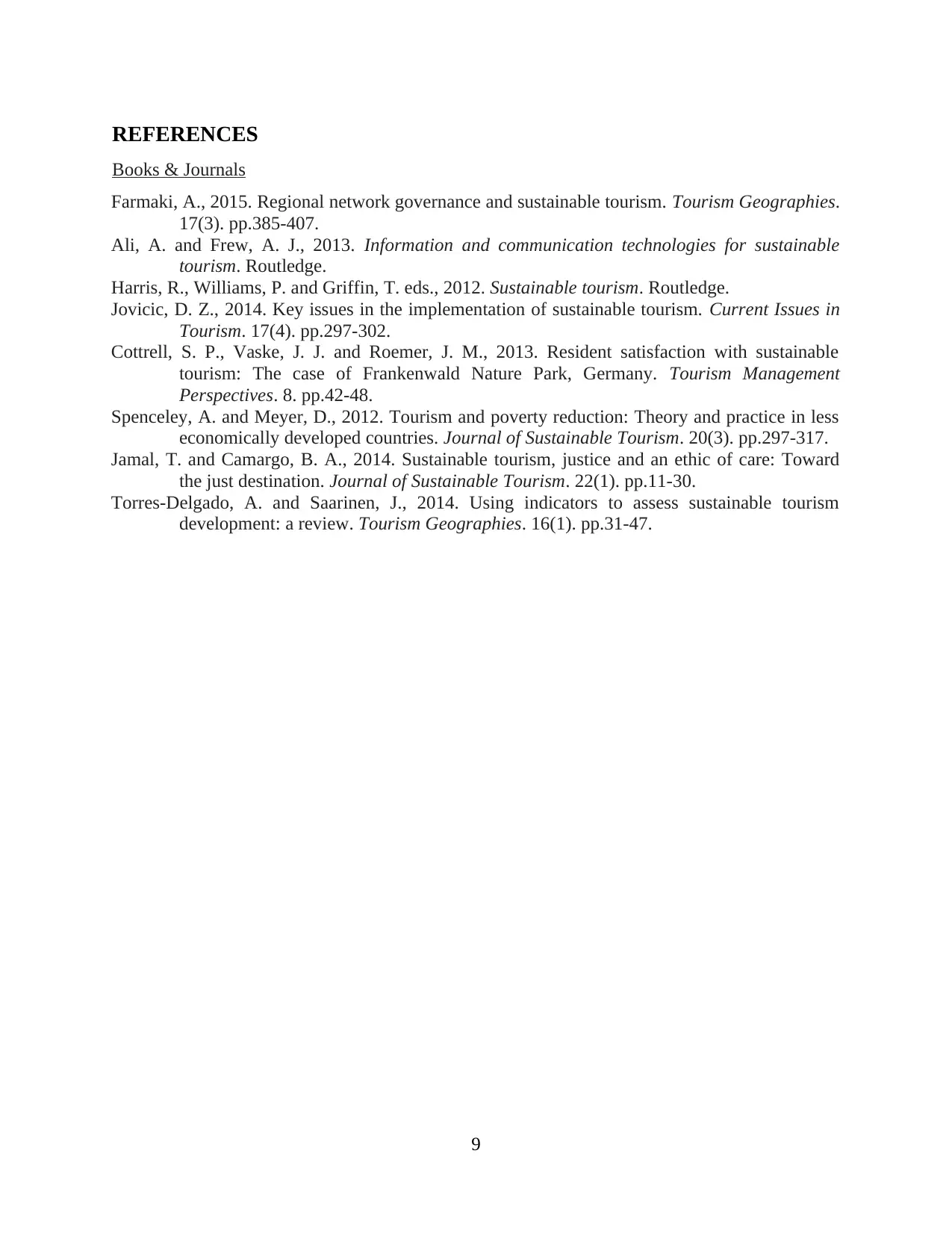
REFERENCES
Books & Journals
Farmaki, A., 2015. Regional network governance and sustainable tourism. Tourism Geographies.
17(3). pp.385-407.
Ali, A. and Frew, A. J., 2013. Information and communication technologies for sustainable
tourism. Routledge.
Harris, R., Williams, P. and Griffin, T. eds., 2012. Sustainable tourism. Routledge.
Jovicic, D. Z., 2014. Key issues in the implementation of sustainable tourism. Current Issues in
Tourism. 17(4). pp.297-302.
Cottrell, S. P., Vaske, J. J. and Roemer, J. M., 2013. Resident satisfaction with sustainable
tourism: The case of Frankenwald Nature Park, Germany. Tourism Management
Perspectives. 8. pp.42-48.
Spenceley, A. and Meyer, D., 2012. Tourism and poverty reduction: Theory and practice in less
economically developed countries. Journal of Sustainable Tourism. 20(3). pp.297-317.
Jamal, T. and Camargo, B. A., 2014. Sustainable tourism, justice and an ethic of care: Toward
the just destination. Journal of Sustainable Tourism. 22(1). pp.11-30.
Torres-Delgado, A. and Saarinen, J., 2014. Using indicators to assess sustainable tourism
development: a review. Tourism Geographies. 16(1). pp.31-47.
9
Books & Journals
Farmaki, A., 2015. Regional network governance and sustainable tourism. Tourism Geographies.
17(3). pp.385-407.
Ali, A. and Frew, A. J., 2013. Information and communication technologies for sustainable
tourism. Routledge.
Harris, R., Williams, P. and Griffin, T. eds., 2012. Sustainable tourism. Routledge.
Jovicic, D. Z., 2014. Key issues in the implementation of sustainable tourism. Current Issues in
Tourism. 17(4). pp.297-302.
Cottrell, S. P., Vaske, J. J. and Roemer, J. M., 2013. Resident satisfaction with sustainable
tourism: The case of Frankenwald Nature Park, Germany. Tourism Management
Perspectives. 8. pp.42-48.
Spenceley, A. and Meyer, D., 2012. Tourism and poverty reduction: Theory and practice in less
economically developed countries. Journal of Sustainable Tourism. 20(3). pp.297-317.
Jamal, T. and Camargo, B. A., 2014. Sustainable tourism, justice and an ethic of care: Toward
the just destination. Journal of Sustainable Tourism. 22(1). pp.11-30.
Torres-Delgado, A. and Saarinen, J., 2014. Using indicators to assess sustainable tourism
development: a review. Tourism Geographies. 16(1). pp.31-47.
9
⊘ This is a preview!⊘
Do you want full access?
Subscribe today to unlock all pages.

Trusted by 1+ million students worldwide
1 out of 9
Related Documents
Your All-in-One AI-Powered Toolkit for Academic Success.
+13062052269
info@desklib.com
Available 24*7 on WhatsApp / Email
![[object Object]](/_next/static/media/star-bottom.7253800d.svg)
Unlock your academic potential
Copyright © 2020–2025 A2Z Services. All Rights Reserved. Developed and managed by ZUCOL.





